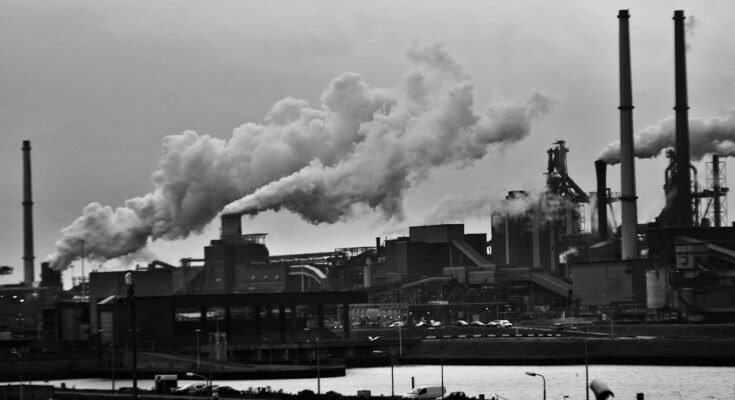human lives and the environment across the world, caused by a combination of human activities and natural processes that release into the air harmful substances. These pollutants have far-reaching and damaging effects on public health, biodiversity, and the environment. This article examines the big impacts of air pollution, the sources of the pollutants, and what can be done to mitigate its effects.
What is Air Pollution?
Air pollution is the release of harmful chemicals, particulates, or biological materials into the air. The sources of air pollution can be summarized as follows:
Human Activities:
Burning fossil fuels (coal, oil, and gas).
Industrial emissions.
Vehicle exhausts.
Agricultural practices.
Deforestation.
Natural Sources:
Volcano eruptions.
Wildfires.
Dust storms.
Effect on Health
Air pollution silently kills millions of people worldwide every year. According to the World Health Organization (WHO), air pollution is among the five most dangerous environmental risks to health. For the sake of brevity, here are some of the health effects attributed to air pollution:
- Respiratory Disease
Pollutants such as PM2.5 and ground-level ozone can irritate the respiratory tract and lead to conditions such as bronchitis, asthma, or chronic obstructive pulmonary disease (COPD).
Long-term exposure to air pollution is associated with an increased risk of lung cancer. - Cardiovascular Disease
Fine particulate matter entering the bloodstream may cause inflammation of the arteries, leading to heart attacks, strokes as well as cardiovascular diseases. - Neurological Effects
While the evidence is still emerging the connection between worsening air quality to cognitive decline along with a greater risk of suffering dementia or even degenerative conditions such as Alzheimer and Parkinson’s disease is worth investigating. - Children: A Unique Vulnerability
The developing lungs are particularly susceptible. It is thought that children exposed to dirty air may have impaired lung growth, impaired development of cognitive abilities, and a greater chance for respiratory infections. - Global Death
It is estimated that out of about 4 million premature deaths caused outdoors every year, 2.6 million deaths are due to indoor air pollution.
Environmental Consequences
Air pollution not only maligns humanity but also has very severe negative effects on ecosystems in the entire world.
Climate Change
Greenhouse gases-among them carbon dioxide (CO2) and methane-sustain heat and contribute to global warming.
Short-lived climate pollutants (SLCPs), including black carbon and tropospheric ozone, increase the severity of climate change while degrading air quality.
Acid Rain
Acid rain is formed by SO2 and NOx reacting with water vapor to form acid compounds that fall to earth. This has a deleterious effect on soils, water bodies, and vegetation.
Harm to Wildlife
Toxic air pollutants may bioaccumulate through the food chain and cause adverse effects to animals and plants. For example, ozone affects the leaf structure leading to reduced growth of plant vines and lower yields in agriculture.
Reduced Visibility
Ambient air pollution causes haze, which decreases visibility, and this lessens the quality of tourism and quality of life.
Some Major Air Pollutants
- Particulate matter (PM): These are substances in the atmosphere that float in particle form and are amongst the smallest that reach the lungs and then into the bloodstream.
- Ground Ozone (O3): Is a harmful secondary pollutant formed from the reaction between sunlight and the pollutants…
- Carbon monoxide (CO): An odourless, colourless, toxic gas produced by incomplete combustion.
- Sulphur dioxide (SO2): Comes from burning fossil fuels that contain sulphur.
- Nitrogen oxides (NOx): Emitted mainly by vehicles and industry.
Economic Implications
Air pollution causes huge economic costs by affecting:
- Health Costs: The treatment of pollution-related diseases exhausts the health systems.
Underproduction of Labor: Illnesses and premature death diminish labor output. - Agricultural loss: Crop production is greatly affected adversely by the pollutants like ozone and acid deposition.
Economic Impacts
Several significant costs are associated with air pollution, including:
- Healthcare costs: Healthcare systems face pressure as pollution-related illnesses must be treated.
- Reduced productivity of labor: With illness, premature deaths affect productivity in labor.
- Agricultural losses: Ozone and acid deposition affect crop production.
Strategies to Reduce Air Pollution
Countering air pollution is a collective responsibility of governments across various spheres. Some methods include:
Strategies to Reduce Air Pollution
Countering air pollution is a collective responsibility of governments across various spheres. Some methods include:
2. Sustainable Technology
Making a shift towards renewable sources like solar, wind, geothermal, and hydropower.
Increase the promotion of electric vehicles and the improvement of public transportation systems.
Emission Control-d wf
The main goal was to set emission standards for different sectors in their transportation.
The carbon tax introduced would discourage the use of fossil fuels.
Tree Plantation
Tree cover and enhancing greenery in urban settings help absorb carbon dioxide.
Cultivating Environmental Awareness
Educating the public on the causes and effects of air pollution inspires people to change their lifestyle habits, such as reducing reliance on personal vehicles.
Partnerships
International commitment arising from the Paris Climate Agreement aims to induce collective action on reducing emissions and instigating agreements among nations.
What To Do
Everyone has a part to play in making the air cleaner:
- Limit energy consumption.
- Purchase eco-friendly goods and contribute to the sustainability of businesses.
- Be advocate to specific statutes.
- Use public transport and carpool.
Conclusion
Air pollution is an ever-changing and escalating issue with severe consequences for public health and the environment. Indeed, a commensurate global push for tackling this situation with greater awareness on the part of participating members of their communities would do us better. Since we have a better understanding of how much our actions affect our environment, it should be easier for us to know how we want to live. We need to act now because, in reality, we are all living in jeopardy.



